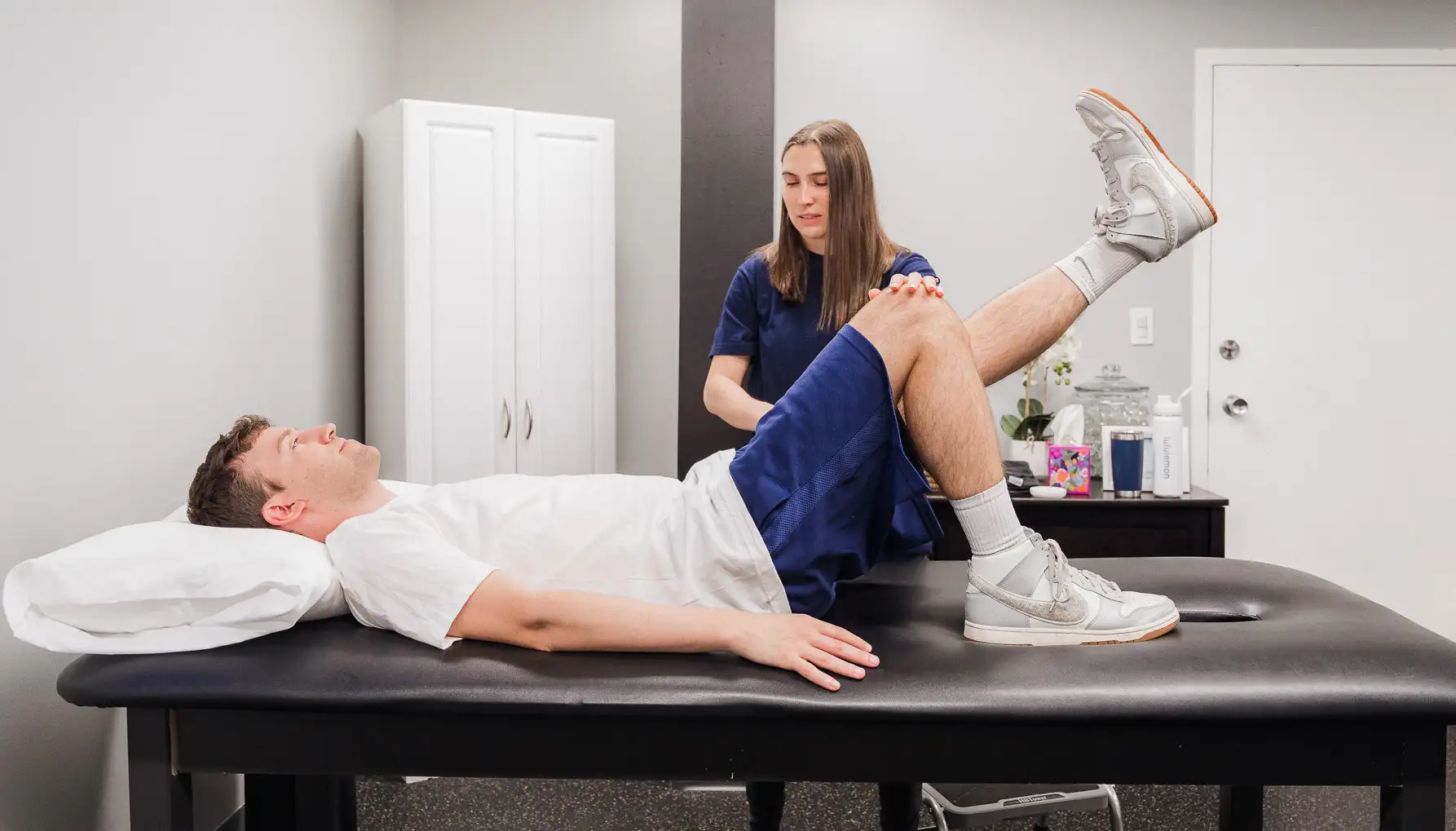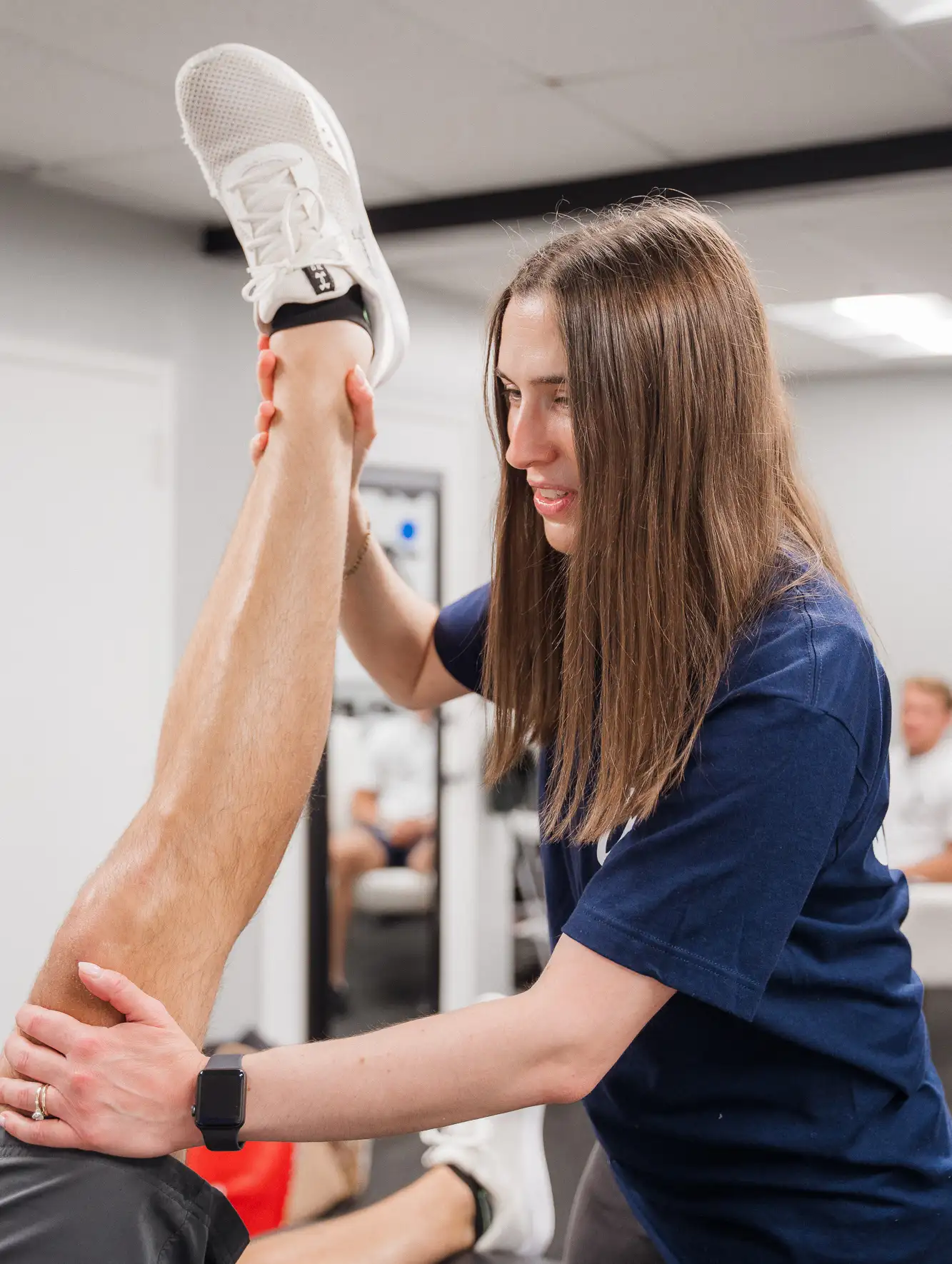Physical Therapy for Hip Pain in Norwood

The hip joint serves as an important component of the lower body, as it allows for both mobility and stability. Hip pain can impact many aspects of daily life, such as walking and/or running, going up and down stairs, standing up from a seated position, or lying on your side. Some people experience hip pain due to a specific injury, such as a labral tear or hamstring jury, while other people develop pain over a longer period of time, perhaps due to conditions like hip osteoarthritis or hip impingement.
About Your Hip
Your hip, or femoroacetabular joint, is formed between the long bone in your thigh (femur) and your pelvis. Just like the shoulder, the hip has a labrum, which helps stabilize the hip and distribute forces appropriately through the joint. The hip is supported by various muscles, tendons, and ligaments.
What are Common Symptoms of Hip Pain?
Some people experience hip pain due to a specific injury, such as a labral tear or hamstring injury, while other people develop pain over a longer period of time, perhaps due to conditions like hip osteoarthritis or hip impingement.
Some symptoms of hip pain may include:
- Pain
- Swelling
- Clicking within the hip
- Stiffness and limited range of motion
- Weakness of muscles in the hip and/or leg
- Difficulty walking and performing other activities
Treating Hip Pain with Physical Therapy
Whether you are seeking treatment for a recent injury, dealing with chronic hip pain, or recovering from hip surgery, at Powered Up Physical Therapy, you will always work one-on-one with a Doctor of Physical Therapy who will create an individualized treatment plan catered specifically to your needs.

Your Initial Evaluation
During your first visit, you will receive a thorough initial evaluation, which will include a discussion of the history of your hip pain or injury as well as a physical examination to determine your range of motion, strength, movement patterns, posture, etc. Your physical therapist will also evaluate whether your hip pain is coming from your hip or whether your pain is from other areas such as your low back, knee, or ankle. Based upon the findings of your evaluation, your physical therapist will use their clinical expertise and the best evidence available to devise a treatment plan for you.
Follow Up Treatments
Each visit will entail one hour of personalized treatment. Your physical therapist will track your progress and adjust your treatment plan as needed. Your treatment plan may include services such as manual therapy, therapeutic exercises, posture and ergonomic education, or other services to help you achieve your goals. You will always receive a targeted home exercise program at the end of each session to perform in between sessions so you’re constantly working on improving your symptoms and addressing your strength and mobility. When done regularly, these exercises will help lead to a faster and stronger recovery!
Below are a few strategies that we use at Powered Up Physical Therapy to help rehabilitate your hip
- Manual therapy such as joint mobilization and soft tissue mobilization (massage)
- Therapeutic exercises
- Education on posture and ergonomics
- Home exercise programs
What Separates Us
At Powered Up Physical Therapy, you will always receive individualized, one-on-one care with a Doctor of Physical Therapy. We dedicate a full hour of our time to work with you. Our treatment philosophy revolves around decreasing your symptoms, identifying the cause of your symptoms, targeting any deficits in strength or mobility, and working with you to achieve your goals and return to the activities you love. We use the best available evidence to create an individualized treatment plan for you that may include services such as manual therapy, therapeutic exercises, posture and ergonomic education, or other services to help you achieve your goals. At Powered Up Physical Therapy, we are committed to getting you back to a better and stronger version of yourself than before!
Hip Conditions We Treat
Some examples of hip conditions we treat include:
- Femoroacetabular impingement syndrome (also known as hip impingement)
- Hip microinstability
- Greater trochanteric pain syndrome
- Hamstring injuries
- Patellar tendinopathy
- Hip adductor injuries
- Piriformis Syndrome

Free 15 Minute Discovery Call
To schedule a complimentary discovery call, please complete the form below. We will reach out to you by the end of the business day. We look forward to speaking with you soon!
Disclaimer: The use of the Internet or this form for communication with the practice or any individual member of the practice does not establish a patient-provider relationship. Confidential or time-sensitive information should not be sent through this form. No professional services are offered on this call.